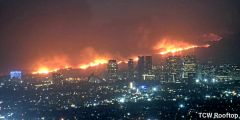Heat dome: Atmosphere, architecture and agency
July 11, 2025
The phrase ‘heat dome’ has been around since the 1960s, according to the Oxford English Dictionary. But only recently has it gained currency as one of the many new (extreme) weather words signalling climate change. I first came across it in 2020 when I read reports on a horrible heat wave in India. At that …
Unmuting the message: Climate communication in a complex world
July 1, 2025
A few weeks ago Shanshan Zhang, Senior Scientific Editor at One Earth, Cell Press, asked me to write something about climate change communication, a topic I have been grappling with for a long time. At first I hesitated, but she really encouraged me and I am glad I wrote something. My little piece became part …
Carbon bombs: On climate change and lexical change
May 2, 2025
Have you heard about car bombs? Surely, you have. Have you heard about ‘carbon bombs’. Probably not. I hadn’t, until my husband shoved The Guardian under my nose this morning and pointed to a headline saying: “UK banks put £75bn into firms building climate-wrecking ‘carbon bombs’, study finds”. He did that because he knew that …
Wildfires and wild liars
January 13, 2025
I have written about wildfires and bushfires and climate change since 2012, here, here, here, here and here, for example. I should have written about the Paradise Fire or the Maui Fire, but I didn’t. And now we have the awful Southern California urban wildfires. What can one say? Fortunately, people more knowledgeable than I …
Plausible climate futures – a book review
November 22, 2024
I was recently watching the images of the devastating floods in the Valencia region of Spain. This brought back memories of the 2021 German floods and all the mud and debris they left behind. I also read an article by the world expert in extreme weather attribution, Friederike Otto who argued that, despite so many …
Chatting with chatbots about the climate crisis
November 15, 2024
Last week, I had another adventure in AI land. This started by accident, as so many adventures do. It all came about because I read about an interesting symposium organised in Amsterdam by Anaïs Augé’s and Gudrun Reijnierse on “Public responses to the language of science communication: Uptake, acceptance, resistance”. As part of this symposium, …










